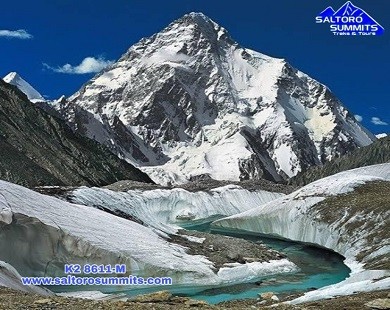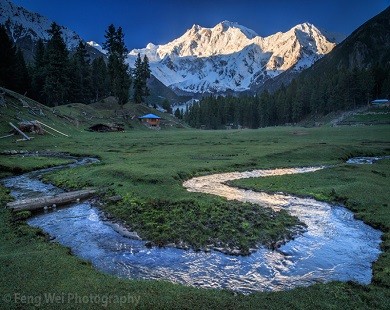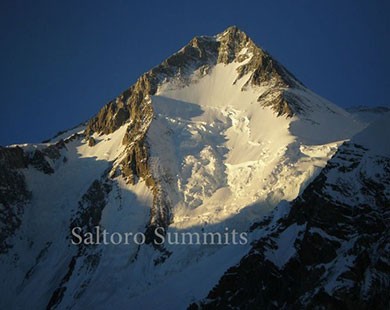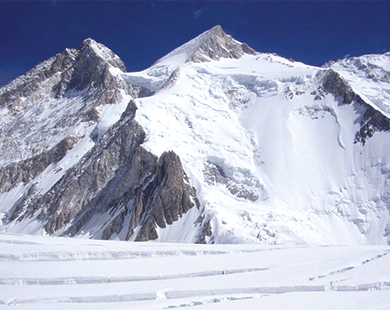- saltoro.summits@gmail.com
Mountaineering in Pakistan: Climbing the Eight-Thousanders
Pakistan is home to some of the world's most difficult and awe-inspiring mountains, with five of the world's fourteen 8,000-meter peaks located within its borders. These towering giants have long drawn the attention of mountaineers from all over the world, offering both adventure and a test of human endurance. Here, we delve into the world of mountaineering in Pakistan, with a focus on the eight-thousanders.
1. K2 (8,611 meters): K2, also known as the "Savage Mountain," is the world's second-highest peak, only slightly shorter than Mount Everest.
It is renowned for its extreme difficulty and high fatality rate, making it one of the ultimate mountaineering challenges.
In 1954, an Italian team led by Ardito Desio made the first successful ascent.
2. Nanga Parbat (8,126 meters): Known as the "Killer Mountain" due to its treacherous history, Nanga Parbat is the world's ninth-highest peak.
Hermann Buhl made the first successful ascent in 1953, which remains one of the most remarkable feats in mountaineering history.
3. Broad Peak (8,051 meters): The 12th highest peak in the world is known for its pyramid-like shape.
An Austrian team completed the first successful ascent in 1957.
4. Gasherbrum I (8,080 meters): Gasherbrum I, also known as Hidden Peak, is the world's 11th tallest mountain.
An American team made the first successful ascent in 1958.
5. Gasherbrum II (8,035 meters): Gasherbrum II is the 13th highest peak on Earth.
An Austrian team made the first successful ascent in 1956.
Mountaineering in Pakistan's eight-thousanders presents unique challenges that necessitate significant technical skill and physical fitness. Here are some key points to consider:
1. Altitude and Harsh Conditions: Climbing at such high altitudes is extremely difficult due to low oxygen levels, extreme cold, and unpredictable weather patterns.
Mountaineers are at risk of altitude sickness, frostbite, and avalanches.
2. Technical Difficulty: These peaks frequently necessitate technical climbing skills such as ice and rock climbing, mixed terrain, and crevasse navigation.
3. Permits and Regulations: Mountaineers must obtain permits from the Pakistani government, and regulations are in place to protect the environment and climbers' safety.
4. Base Camps and Logistics: Expeditions typically establish base camps at lower altitudes to acclimate and prepare for the summit push.
Transportation, supplies, and support staff are all essential for a successful expedition.
5. Environmental Preservation: Climbers and expedition teams are encouraged to follow Leave No Trace principles to reduce their environmental impact.
Despite the difficulties, mountaineers are drawn to Pakistan's eight-thousanders for the unparalleled sense of accomplishment and the breathtaking beauty of the Karakoram Range. Conquering these peaks requires not only physical strength and technical expertise, but also mental fortitude and a deep appreciation for nature's majesty.
Finally, mountaineering in Pakistan's eight-thousanders offers a unique and demanding adventure that draws climbers from all over the world. It is a test of human limits, both physically and mentally, as well as an opportunity to explore some of the most remote and spectacular landscapes on the planet.

Duration: 60 Days
Location: Baltoro, Karakoram
Includes:
![]()
![]()
![]()
![]()
![]()
(27 Reviews)

Duration: 50 Days
Location: Chilas, Gilgit Baltistan
Includes:
![]()
![]()
![]()
![]()
![]()
(27 Reviews)

Duration: 50 Days
Location: Baltoro, Karakoram, Baltistan, Pakistan
Includes:
![]()
![]()
![]()
![]()
![]()
(27 Reviews)

Duration: 50 days
Location: Karakoram, Baltistan, Pakistan
Includes:
![]()
![]()
![]()
![]()
![]()
(27 Reviews)

Duration: 50 Days
Location: Baltoro, Karakoram, Baltistan, Pakistan
Includes:
![]()
![]()
![]()
![]()
![]()
(27 Reviews)

